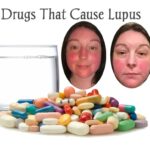Drugs That Cause Autoimmune Diseases

Autoimmune diseases are a group of disorders in which the immune system mistakenly attacks healthy cells and tissues in the body. Normally, the immune system protects the body by attacking harmful foreign substances like viruses, bacteria, and cancer cells. However, in autoimmune diseases, the immune system cannot distinguish between healthy cells and harmful foreign substances, leading it to attack healthy cells and tissues.
There are more than 80 different types of autoimmune diseases, and some of the most common ones include rheumatoid arthritis, lupus, multiple sclerosis, type 1 diabetes, psoriasis, and inflammatory bowel disease. Symptoms of autoimmune diseases can vary depending on the specific disease and the affected organs, but common symptoms include fatigue, joint pain, rashes, fever, and digestive issues
The causes of autoimmune diseases are not fully understood, but a combination of genetic, environmental, and lifestyle factors are believed to contribute to their development. Autoimmune diseases are relatively common, affecting millions of people worldwide. The prevalence of autoimmune diseases varies depending on the specific disease and the population being studied. Some autoimmune diseases, such as rheumatoid arthritis and multiple sclerosis, are more common in women than men, while others, such as type 1 diabetes, affect both genders equally.
According to the American Autoimmune Related Diseases Association, approximately 50 million Americans, or 20 percent of the population, have an autoimmune disease. Women are more likely than men to develop autoimmune diseases, with about 75 percent of autoimmune disease cases occurring in women. Autoimmune diseases can occur at any age, but many of them are more common in middle-aged adults and seniors.
The prevalence of autoimmune diseases is increasing globally, and researchers believe that environmental factors, such as changes in diet and exposure to toxins, may be contributing to this trend. However, more research is needed to fully understand the underlying causes of autoimmune diseases and how to effectively prevent and treat them.
Drug-Induced Autoimmune Diseases
Drug-induced autoimmune diseases are a type of autoimmune disease that develops as a result of exposure to certain medications or drugs. These drugs can trigger an abnormal immune response in the body, leading to the development of autoimmune diseases. The symptoms of drug-induced autoimmune diseases can range from mild to severe and can affect various organs and tissues in the body, depending on the specific drug involved.
The development of drug-induced autoimmune diseases can be difficult to predict, and not all individuals who take these medications will develop an autoimmune disease. However, if symptoms suggestive of autoimmune disease occur after starting a new medication, it is important to talk to a healthcare provider, who may consider stopping the medication or switching to an alternative therapy.
What Drugs Trigger Autoimmune Disease?
While many drugs have been associated with the development of autoimmune diseases, it’s important to note that not all individuals who take these medications will develop an autoimmune disease. The following is a list of the most common drugs that have been reported to cause autoimmune diseases:
1. Hydralazine: Hydralazine is a medication used to treat high blood pressure. It has been associated with the development of drug-induced lupus erythematosus, a type of autoimmune disease that can cause symptoms such as joint pain, skin rash, and fever.
2. Procainamide: Procainamide is a medication used to treat irregular heartbeats. It has been associated with the development of drug-induced lupus erythematosus and autoimmune hemolytic anemia, a condition in which the immune system attacks and destroys red blood cells.
3. Minocycline: Minocycline is an antibiotic used to treat acne. It has been associated with the development of drug-induced lupus erythematosus and autoimmune hepatitis, a condition in which the immune system attacks the liver.
4. Methyldopa: Methyldopa is a medication used to treat high blood pressure. It has been associated with the development of autoimmune hemolytic anemia.
5. Carbamazepine: Carbamazepine is a medication used to treat seizures. It has been associated with the development of drug-induced systemic lupus erythematosus, a type of autoimmune disease that can cause symptoms such as joint pain, skin rash, and fatigue.
6. Phenytoin: Phenytoin is a medication used to treat seizures. It has been associated with the development of drug-induced systemic lupus erythematosus and autoimmune hepatitis.
7. Quinidine: Quinidine is a medication used to treat irregular heartbeats. It has been associated with the development of drug-induced lupus erythematosus and autoimmune hemolytic anemia.
8. Chlorpromazine: Chlorpromazine is a medication used to treat mental health conditions. It has been associated with the development of drug-induced lupus erythematosus.
9. Isoniazid: Isoniazid is a medication used to treat tuberculosis. It has been associated with the development of drug-induced lupus erythematosus.
10. Interferon alpha, beta, and gamma: These medications are used to treat certain types of cancer and viral infections. They have been associated with the development of autoimmune diseases such as lupus erythematosus, thyroiditis, and rheumatoid arthritis.
11. Etanercept, infliximab, and adalimumab: These medications are used to treat autoimmune diseases such as rheumatoid arthritis and psoriasis. However, they have also been associated with the development of drug-induced lupus erythematosus.
12. Rituximab: Rituximab is a medication used to treat certain types of cancer and autoimmune diseases such as rheumatoid arthritis. However, it has also been associated with the development of drug-induced autoimmune diseases such as lupus erythematosus and vasculitis.
13. Abatacept: Abatacept is a medication used to treat rheumatoid arthritis. However, it has been associated with the development of drug-induced lupus erythematosus.
14. Alemtuzumab: Alemtuzumab is a medication used to treat certain types of cancer and multiple sclerosis. However, it has been associated with the development of drug-induced autoimmune diseases such as autoimmune thyroiditis and autoimmune hemolytic anemia.
15. Pembrolizumab: Pembrolizumab is a medication used to treat certain types of cancer. It works by blocking a protein called PD-1, which helps the immune system recognize and attack cancer cells. However, it has been associated with the development of autoimmune diseases such as colitis, hypothyroidism, and pneumonitis.
16. Ipilimumab: Ipilimumab is a medication used to treat certain types of cancer. It works by blocking a protein called CTLA-4, which helps regulate the immune system. However, it has been associated with the development of autoimmune diseases such as colitis, hypophysitis, and thyroiditis.
It’s important to note that the risk of developing drug-induced autoimmune diseases varies depending on the medication and the individual. Some people may be more susceptible to developing autoimmune diseases due to genetic or other factors, while others may not experience any adverse effects from the medication. Additionally, some medications may be more likely to cause autoimmune diseases in certain populations, such as women or people with a family history of autoimmune diseases.
If you are taking a medication and are concerned about the risk of developing an autoimmune disease, it’s important to talk to your healthcare provider. They can provide you with more information about the potential risks and benefits of the medication, and help you make an informed decision about your treatment options.
Again, it’s important to note that not all individuals who take these medications will develop autoimmune diseases, and some of these medications are used to treat autoimmune diseases themselves. The risk of developing drug-induced autoimmune diseases should be weighed against the potential benefits of the medication, and individuals should always discuss any concerns with their healthcare provider.
How to Prevent Drug-Induced Autoimmune Diseases
Preventing drug-induced autoimmune diseases can be challenging, as there is no foolproof way to avoid them. However, there are several steps you can take to reduce your risk of developing these conditions:
1. Be aware of the potential risks: If you are taking a medication that has been associated with the development of autoimmune diseases, it’s important to be aware of the potential risks. Talk to your healthcare provider about the potential side effects of the medication and what signs and symptoms to watch out for.
2. Monitor your symptoms: If you are taking a medication that has been associated with the development of autoimmune diseases, it’s important to monitor your symptoms carefully. If you experience any new or unusual symptoms, such as joint pain, skin rash, or fever, contact your healthcare provider right away.
3. Follow the prescribed dosage: Taking medications in the prescribed dosage and following the instructions provided by your healthcare provider can help reduce the risk of developing autoimmune diseases. It’s important not to exceed the recommended dosage or take the medication for longer than prescribed.
4. Talk to your healthcare provider: If you have a history of autoimmune diseases or other risk factors, such as a family history of autoimmune diseases, it’s important to talk to your healthcare provider before starting a new medication. They can help determine whether the medication is appropriate for you and what steps you can take to minimize your risk of developing autoimmune diseases.
5. Consider alternative treatments: In some cases, alternative treatments may be available that do not carry the risk of autoimmune diseases. For example, if you are taking a medication for a non-life-threatening condition, such as mild acne, your healthcare provider may be able to recommend alternative treatments that do not carry the same risks.
In summary, preventing drug-induced autoimmune diseases involves being aware of the potential risks, monitoring your symptoms, following the prescribed dosage, talking to your healthcare provider, and considering alternative treatments if available.





